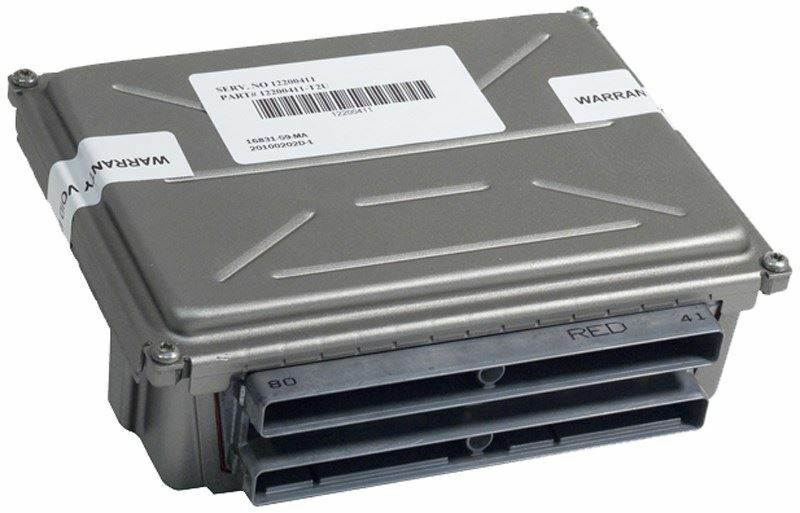Is Your Grand Prix Running Rough? The PCM Might Be the Culprit.
If your 2001, 2002, or 2003 Pontiac Grand Prix is suffering from erratic engine behavior, poor fuel economy, harsh shifting, or an illuminated Check Engine Light that won’t go away, the problem may lie deep within its electronic nervous system: the Powertrain Control Module (PCM). As the master computer for your engine and transmission, a failing PCM can cause a cascade of frustrating and difficult-to-diagnose issues. This isn’t just an inconvenience; it affects your vehicle’s performance, reliability, and emissions.
This replacement Powertrain Control Module, part number 12202600, is the definitive solution to restore your vehicle’s factory performance. It serves as a direct replacement for a wide range of GM vehicles from the early 2000s, including those originally equipped with part numbers 12209614 and 09360210. We take the guesswork and hassle out of the replacement process by programming the module specifically for your car using the VIN you provide. This ensures that all communications between the engine, transmission, and other vehicle systems are perfectly synchronized, just as the manufacturer intended.
From the Diagnostic Bay
We once had a 2002 Pontiac Aztek come in with a persistent P0300 (Random Misfire) code. The owner had already replaced the spark plugs, wires, ignition coils, and even the fuel injectors, spending hundreds of dollars with no success. The misfire was intermittent but getting worse. After hooking up our diagnostic tools, we noticed the fuel trim and ignition timing data were fluctuating wildly for no apparent reason. Instead of throwing more parts at it, we focused on the data source: the PCM. A quick swap with a correctly programmed module like this one, followed by a crankshaft variation relearn, solved the problem instantly. The engine smoothed out, and the code never returned. It’s a classic case of the symptoms pointing to one thing, while the root cause is the computer itself.
Diagnosing a Faulty 2001-2003 Grand Prix PCM
A failing PCM can manifest in numerous ways, often mimicking other component failures. If you’re experiencing any of the following, it’s time to consider your PCM as the potential source of the problem.
- ✔ Check Engine Light: The most common indicator, often with communication-related trouble codes (U-codes) or multiple, seemingly unrelated sensor codes.
- ✔ Engine Stalling or Misfiring: The engine may stall for no reason, run rough, or experience random misfires that new spark plugs and coils can’t fix.
- ✔ Harsh or Failed Shifting: The PCM controls the transmission’s shift points. A faulty module can lead to delayed, hard, or erratic shifting.
- ✔ No Start or Intermittent Start: The PCM controls the fuel and spark delivery required for ignition. If it fails, your car may not start at all.
- ✔ Poor Fuel Economy: Incorrect fuel mixture and timing calculations from a failing module can cause a significant drop in MPG.
- ✔ Failed Emissions Test: A malfunctioning PCM can prevent the emissions system from operating correctly, leading to a failed test.
The Plug-and-Play Solution
Replacing a PCM used to mean a trip to the dealership for expensive programming. Our process eliminates that step. When you purchase this module, you simply provide us with your vehicle’s 17-digit VIN. Our technicians will then flash the unit with the latest GM-certified software calibration for your exact vehicle. This ensures that when the module arrives, it’s ready for installation. While the unit is programmed for your vehicle, a final security and crankshaft position sensor (CASE) relearn procedure will likely be required by your mechanic using a compatible scan tool after installation. This is a standard final step for GM vehicles of this era to ensure optimal performance and security.
This module is a direct fit for a vast array of GM models, including the Pontiac Grand Am, Aztek, and Montana; Chevrolet Impala, Monte Carlo, and Malibu; Buick Century and Regal; and Oldsmobile Alero, Aurora, and Silhouette, among others. If your vehicle is listed in the compatibility chart and requires one of the specified part numbers, this is the correct component to get you back on the road with confidence.
Frequently Asked Questions
Do I need to have this module programmed?
No. We handle the programming for you before shipment. Simply provide your vehicle’s VIN during or after checkout, and we will load the correct GM software for your specific car.
Is this a simple plug-and-play installation?
Mostly. While the module is a direct physical fit and is electronically programmed for your VIN, GM vehicles of this generation typically require a security relearn (VATS) and a Crankshaft Variation (CASE) relearn procedure to be performed with a professional scan tool after installation. This ensures the anti-theft system works and the engine runs smoothly.
Will this fix my check engine light?
If the check engine light and associated codes are caused by a faulty PCM, then yes, this part will resolve the issue. However, it’s crucial to ensure a proper diagnosis has been performed, as the light could be on for other reasons like a bad sensor or wiring issue.
Where is the PCM located on my Grand Prix?
On most 2001-2003 Pontiac Grand Prix models, the Powertrain Control Module (PCM) is located in the engine compartment, inside the air filter box assembly on the driver’s side.
How do I provide my VIN?
You can add your 17-digit Vehicle Identification Number (VIN) in the notes section at checkout or send it to us in a message after you place your order. We cannot ship the module until we receive your VIN.


